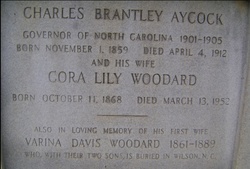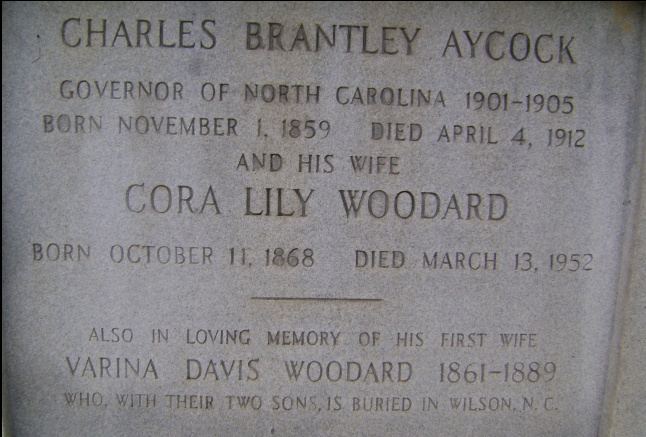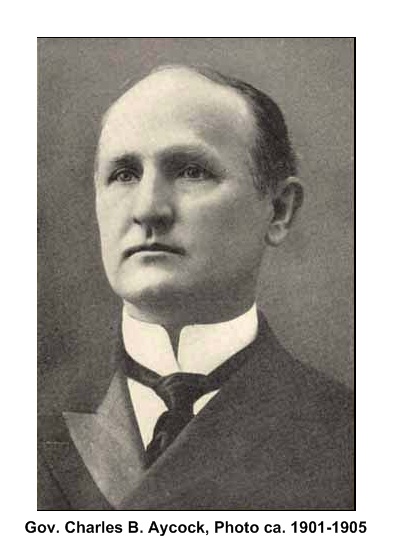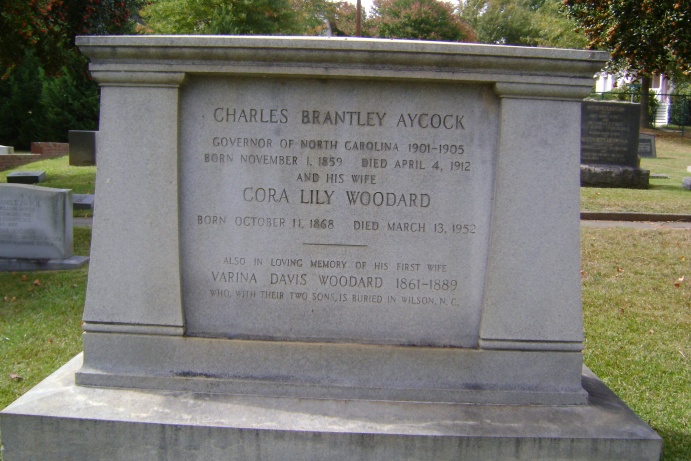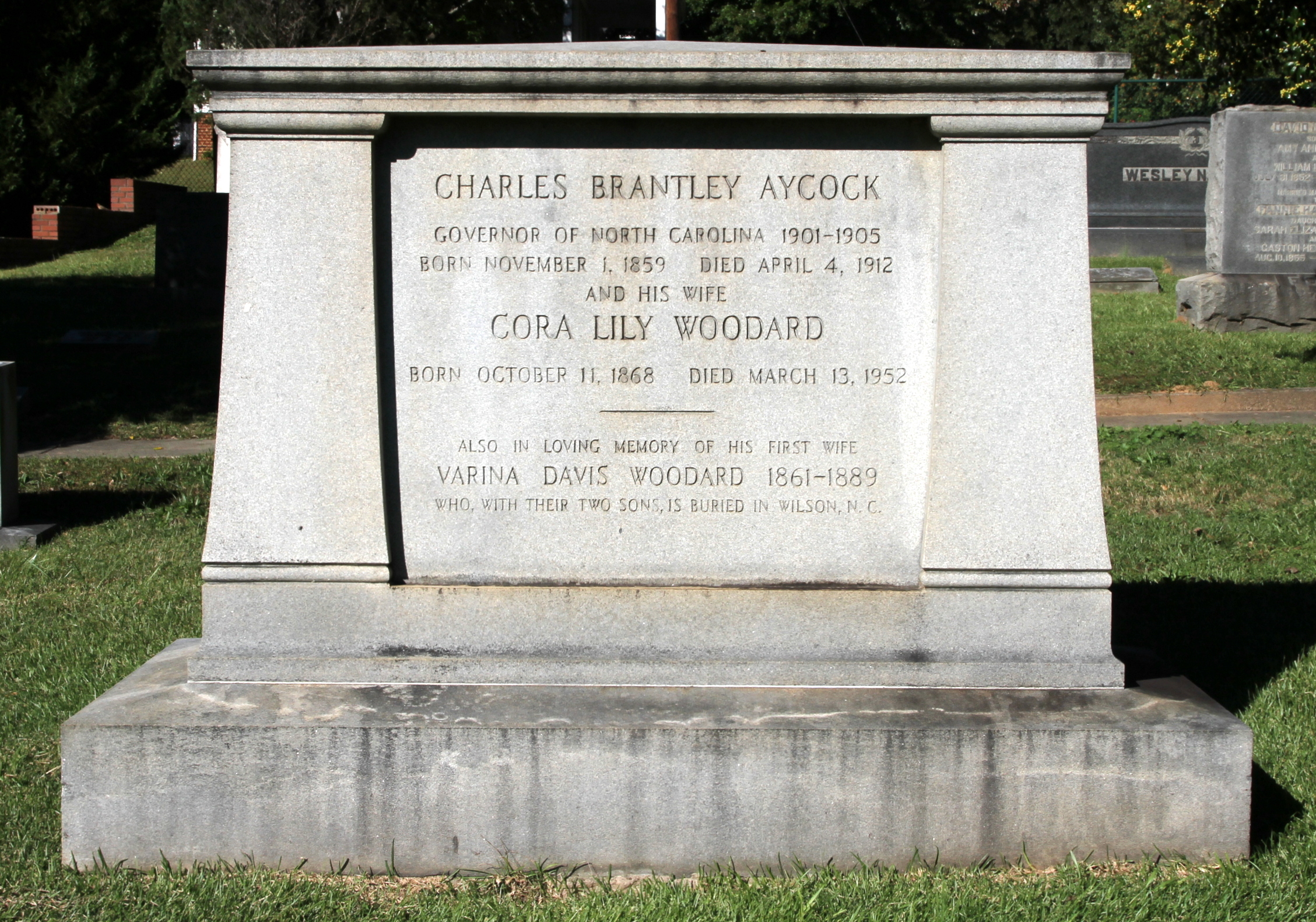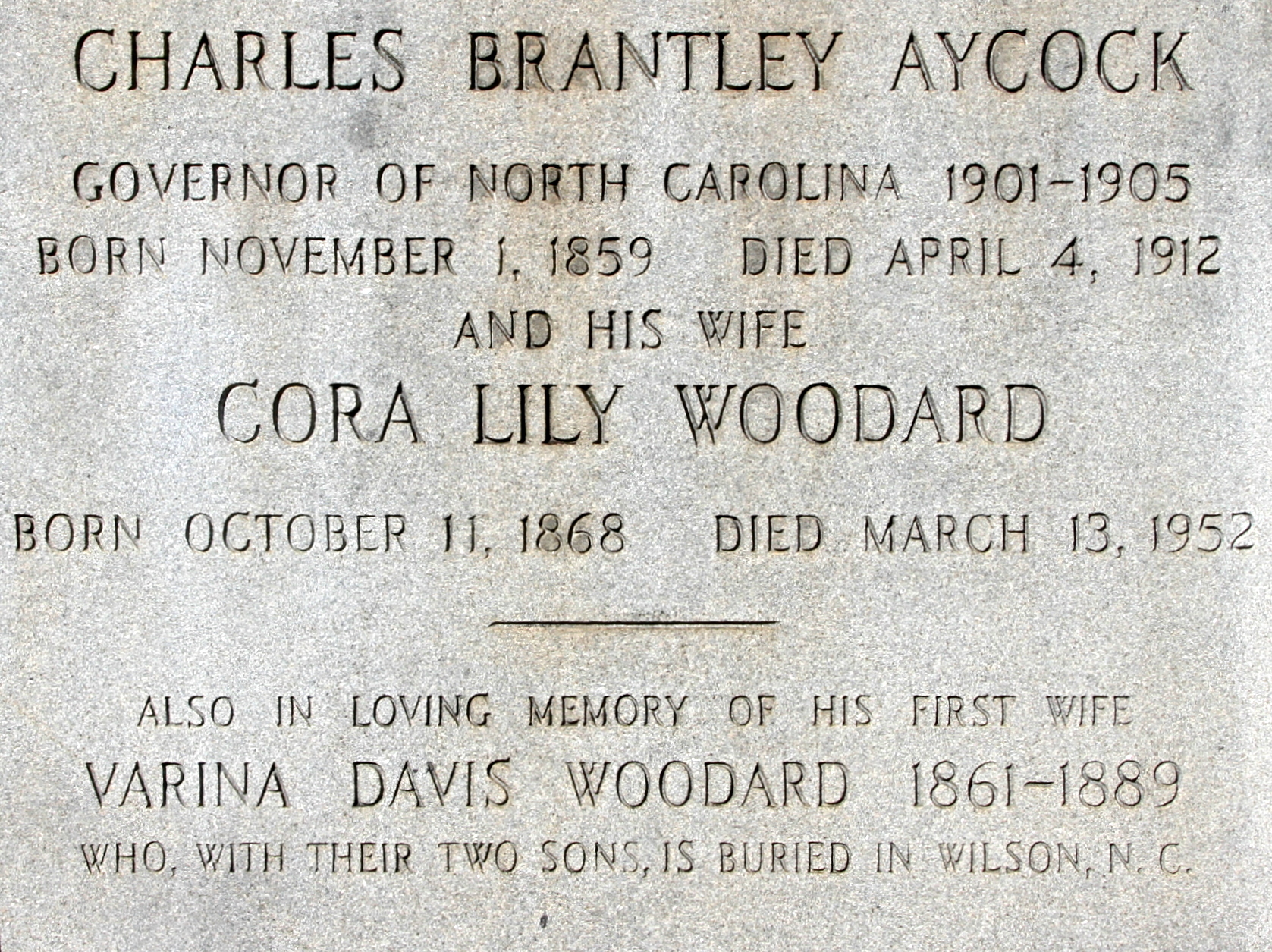Cora Lily Woodard was born 1868 in Gardner Township, Wilson County, NC, the youngest of 6 known surviving children (2 boys/4 girls) born to farmer and church Elder William Woodard, Jr. and his wife, Delphia "Delphy" Rountree.
She was the paternal grandchild of William Woodard Sr. & Elizabeth Simms of Wayne County, NC; and gr-grandchild of David Woodard & Elizabeth Bullock of Edgecombe County. She is descended from a long line of Woodards in Virginia and North Carolina, dating back to Christopher Woodard who came to the Virginia Colonies from England ca. 1620. On her mother's side, she was the maternal grandchild of Wiley/Willie Rountree and Martha Dew of Wayne County. (The Rountree surname is also found as Roundtree.)
Cora was just 13 years old when her 20-year old sister, Alice Verina Davis Woodard, married 22-year old Charles Brantley Aycock on May 25, 1881. Charles had just graduated one year earlier from UNC, and was practicing law in Goldsboro, where he supplemented his income by teaching school, and later became Superintendent of Schools for Wayne County. Charles was the son of CSA Senator Benjamin Aycock (1864-65) and his wife Serena Hooks of Wayne County. Charles and Verina would become parents to 3 known children:
* Charles B. Aycock, Jr. (1883-1901)
* Ernest Woodard Aycock (1882-1882)
* Alice Verina Aycock (1886-1963).
The couple were married just 9 years when Alice Woodard Aycock died suddenly Jul 9,1889 at age 28, leaving a husband and two small children. Alice was buried in Wilson alongside their infant son, Ernest, who had died in 1882.
Just about 18 months later on January 7, 1891, 23-year old Cora became the 2nd wife of her 31-year old brother-in-law, Charles Brantley, and stepmother to her nephew and niece. The couple set up housekeeping in Goldsboro, and Cora and Charles would eventually become parents to 7 known children:
* William Benjamin Aycock (1892-1983)
* Mary Lily Aycock (1893-1982)
* Connor Aycock (1895-1941)
* John Lee Aycock (1897-1971), Evanston IL
* Louisa Rountree Aycock (1899-1945)
* Frank Daniel Aycock (1902-1956)
* Brantley Aycock, (1903-1933)*
Brantley Aycock legally changed his name to Charles Brantley Aycock III after his father's death.
Her husband's political career had begun to take off in 1888 and by 1893 Charles was serving as U. S. Attorney for the Eastern District of NC, where he remained until 1897. From 1898-1900 he was prominent and a leading spokesman in the Democratic Party's "white supremacy" campaigns launched throughout the South, which historians say were marked by widespread violence, voter intimidation, voter fraud and even participated in the murderous Wilmington Insurrection of 1898, a coup d'etat of the government which proved to be the one and only coup d'etat in United States history. The "White Supremecy" campaigns were a backlash against the gains African-Americans had been granted after the Civil War, and the movement had far-reaching consequences: Blacks were removed from the voter rolls based on literacy tests, Jim Crow customs were encoded into law, and the Democratic Party would emerge to control Tar Heel politics for the next two-thirds of the 20th century. In 1900, the 41-year old ran for Governor on a platform of white supremecy and the promise of an improved educational system in North Carolina, soundly beating Republican Spencer Adams with the largest majority ever won over an opposition party in North Carolina.
In 1901, Charles, Cora and their then 7 children (5 of hers, and 2 of her sister's) moved to Raleigh where Charles would be Governor for the next four years. Soon after their arrival in the Capital city, Charles' eldest son and namesake (by his marriage to Varina) died in 1901 at the age of 18. Six months later Cora gave birth to her and Charles' 6th child, Frank Daniel Aycock.
As governor, Aycock became known as the "Education Governor" for his support of the public school system. It was said that one school was constructed in the state for every day he was in office. He was reportedly dedicated to education after watching his beloved mother make her mark when signing a deed and realizing she could not read or write. He felt that no lasting social reform could be accomplished without education. He supported increased salaries for teachers, longer school terms, and new school buildings. During his 4-year term, 690 new schoolhouses erected, including 91 for blacks. (The number of schools built during Aycock's term as been reported as low as 690 and as high as 3,459. The number 690 was reported in his son-in-law's book of his speeches. It is oft reported that a new school was built for every day he was in office. He was in office about 1,460 days.)
After his term ended, the couple returned to Goldsboro where her husband resumed the practice of law, and where their 7th child, Brantley, was born in 1907. Charles continued his fight for better education, and even after leaving office he traveled the country promoting the cause; and he also became one of the leading speakers in the campaign for State-wide prohibition. In 1909, the family moved once again back to Raleigh where her husband formed a law partnership with Hon. Robert W. Winston, which lasted until Aycock's death. In May of 1911, Charles announced himself a candidate for Democratic nomination for United States Senate. Just about a year later on April 4, 1912, he died suddenly of a heart attack at age 53 in Birmingham, AL while addressing the Alabama Educational Association on Universal Education. (In his last years Aycock was frequently attacked by the heart trouble which finally proved fatal.)
His wife of 21 years had his remains returned to Raleigh and he was buried in Oakwood Cemetery with great honors and massive funeral attendance. His 44-year old widow never remarried and survived him 40 years, passing in 1952 at the advanced age of 84. She was buried in Oakwood with her husband, and would eventually be joined there by most of their children.
Just prior to her husband's death, daughter Alice Varnina Aycock (child of his first marriage) married Clarence "Hamilton" Poe on 28 Feb 1912. Poe, along with co-author Robert Diggs Wimberly, would author the very popular book, "The Life and Speeches of Charles Brantley Aycock" published in 1912 with copyright and royalties going to the widow, Cora Woodard Aycock.
During Cora's widowhood, and for most of the 20th century, Charles Aycock was treated by historians and North Carolina politicians as an admirable, almost saintly figure. Other reforms he supported included laws to establish fair election machinery, to prevent lynching, to erect a reformatory for boys, and to restrict child labor. The irony of his administration is that he proposed the amendment that passed into the State constitution that would bar illiterate blacks from voting; yet he help build the schools that would later help blacks receive the education to give them access to the polls. In the years following his death, schools were named after him, and a bronze statue of Aycock by Charles Keck was submitted by the North Carolina Legislature to the National Statuary Hall Collection in 1932. Despite some of his detractors today, who examine the past in the context of today's thoughts, it must still be said that Charles Brantley Aycock was a great man of his time and he contributed greatly to the State of North Carolina.
Cora Lily Woodard was born 1868 in Gardner Township, Wilson County, NC, the youngest of 6 known surviving children (2 boys/4 girls) born to farmer and church Elder William Woodard, Jr. and his wife, Delphia "Delphy" Rountree.
She was the paternal grandchild of William Woodard Sr. & Elizabeth Simms of Wayne County, NC; and gr-grandchild of David Woodard & Elizabeth Bullock of Edgecombe County. She is descended from a long line of Woodards in Virginia and North Carolina, dating back to Christopher Woodard who came to the Virginia Colonies from England ca. 1620. On her mother's side, she was the maternal grandchild of Wiley/Willie Rountree and Martha Dew of Wayne County. (The Rountree surname is also found as Roundtree.)
Cora was just 13 years old when her 20-year old sister, Alice Verina Davis Woodard, married 22-year old Charles Brantley Aycock on May 25, 1881. Charles had just graduated one year earlier from UNC, and was practicing law in Goldsboro, where he supplemented his income by teaching school, and later became Superintendent of Schools for Wayne County. Charles was the son of CSA Senator Benjamin Aycock (1864-65) and his wife Serena Hooks of Wayne County. Charles and Verina would become parents to 3 known children:
* Charles B. Aycock, Jr. (1883-1901)
* Ernest Woodard Aycock (1882-1882)
* Alice Verina Aycock (1886-1963).
The couple were married just 9 years when Alice Woodard Aycock died suddenly Jul 9,1889 at age 28, leaving a husband and two small children. Alice was buried in Wilson alongside their infant son, Ernest, who had died in 1882.
Just about 18 months later on January 7, 1891, 23-year old Cora became the 2nd wife of her 31-year old brother-in-law, Charles Brantley, and stepmother to her nephew and niece. The couple set up housekeeping in Goldsboro, and Cora and Charles would eventually become parents to 7 known children:
* William Benjamin Aycock (1892-1983)
* Mary Lily Aycock (1893-1982)
* Connor Aycock (1895-1941)
* John Lee Aycock (1897-1971), Evanston IL
* Louisa Rountree Aycock (1899-1945)
* Frank Daniel Aycock (1902-1956)
* Brantley Aycock, (1903-1933)*
Brantley Aycock legally changed his name to Charles Brantley Aycock III after his father's death.
Her husband's political career had begun to take off in 1888 and by 1893 Charles was serving as U. S. Attorney for the Eastern District of NC, where he remained until 1897. From 1898-1900 he was prominent and a leading spokesman in the Democratic Party's "white supremacy" campaigns launched throughout the South, which historians say were marked by widespread violence, voter intimidation, voter fraud and even participated in the murderous Wilmington Insurrection of 1898, a coup d'etat of the government which proved to be the one and only coup d'etat in United States history. The "White Supremecy" campaigns were a backlash against the gains African-Americans had been granted after the Civil War, and the movement had far-reaching consequences: Blacks were removed from the voter rolls based on literacy tests, Jim Crow customs were encoded into law, and the Democratic Party would emerge to control Tar Heel politics for the next two-thirds of the 20th century. In 1900, the 41-year old ran for Governor on a platform of white supremecy and the promise of an improved educational system in North Carolina, soundly beating Republican Spencer Adams with the largest majority ever won over an opposition party in North Carolina.
In 1901, Charles, Cora and their then 7 children (5 of hers, and 2 of her sister's) moved to Raleigh where Charles would be Governor for the next four years. Soon after their arrival in the Capital city, Charles' eldest son and namesake (by his marriage to Varina) died in 1901 at the age of 18. Six months later Cora gave birth to her and Charles' 6th child, Frank Daniel Aycock.
As governor, Aycock became known as the "Education Governor" for his support of the public school system. It was said that one school was constructed in the state for every day he was in office. He was reportedly dedicated to education after watching his beloved mother make her mark when signing a deed and realizing she could not read or write. He felt that no lasting social reform could be accomplished without education. He supported increased salaries for teachers, longer school terms, and new school buildings. During his 4-year term, 690 new schoolhouses erected, including 91 for blacks. (The number of schools built during Aycock's term as been reported as low as 690 and as high as 3,459. The number 690 was reported in his son-in-law's book of his speeches. It is oft reported that a new school was built for every day he was in office. He was in office about 1,460 days.)
After his term ended, the couple returned to Goldsboro where her husband resumed the practice of law, and where their 7th child, Brantley, was born in 1907. Charles continued his fight for better education, and even after leaving office he traveled the country promoting the cause; and he also became one of the leading speakers in the campaign for State-wide prohibition. In 1909, the family moved once again back to Raleigh where her husband formed a law partnership with Hon. Robert W. Winston, which lasted until Aycock's death. In May of 1911, Charles announced himself a candidate for Democratic nomination for United States Senate. Just about a year later on April 4, 1912, he died suddenly of a heart attack at age 53 in Birmingham, AL while addressing the Alabama Educational Association on Universal Education. (In his last years Aycock was frequently attacked by the heart trouble which finally proved fatal.)
His wife of 21 years had his remains returned to Raleigh and he was buried in Oakwood Cemetery with great honors and massive funeral attendance. His 44-year old widow never remarried and survived him 40 years, passing in 1952 at the advanced age of 84. She was buried in Oakwood with her husband, and would eventually be joined there by most of their children.
Just prior to her husband's death, daughter Alice Varnina Aycock (child of his first marriage) married Clarence "Hamilton" Poe on 28 Feb 1912. Poe, along with co-author Robert Diggs Wimberly, would author the very popular book, "The Life and Speeches of Charles Brantley Aycock" published in 1912 with copyright and royalties going to the widow, Cora Woodard Aycock.
During Cora's widowhood, and for most of the 20th century, Charles Aycock was treated by historians and North Carolina politicians as an admirable, almost saintly figure. Other reforms he supported included laws to establish fair election machinery, to prevent lynching, to erect a reformatory for boys, and to restrict child labor. The irony of his administration is that he proposed the amendment that passed into the State constitution that would bar illiterate blacks from voting; yet he help build the schools that would later help blacks receive the education to give them access to the polls. In the years following his death, schools were named after him, and a bronze statue of Aycock by Charles Keck was submitted by the North Carolina Legislature to the National Statuary Hall Collection in 1932. Despite some of his detractors today, who examine the past in the context of today's thoughts, it must still be said that Charles Brantley Aycock was a great man of his time and he contributed greatly to the State of North Carolina.
Inscription
(2nd) Wife of Gov. Charles Brantley Aycock
Family Members
Sponsored by Ancestry
Advertisement
Explore more
Sponsored by Ancestry
Advertisement
